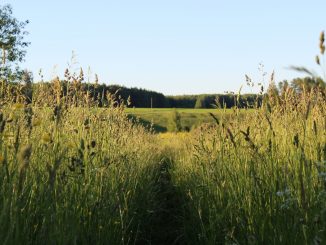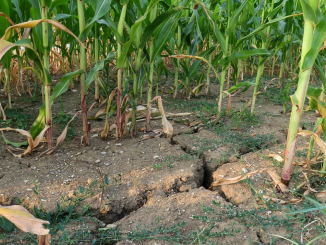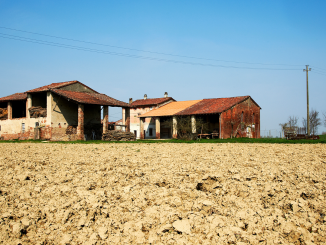
 Meet Nikos Tsioumplekas, a budding farmer who is reviving the family farm in Western Macedonia in the North of Greece. So far he has restored his great-grandfather’s orchards and planted a vegetable garden. Inspired by Greek tradition and best practices from all over the world, Nikos is determined to realise his farming vision.
Meet Nikos Tsioumplekas, a budding farmer who is reviving the family farm in Western Macedonia in the North of Greece. So far he has restored his great-grandfather’s orchards and planted a vegetable garden. Inspired by Greek tradition and best practices from all over the world, Nikos is determined to realise his farming vision.
If someone had told me ten years ago that I was going to be a farmer, my most likely reaction would be a “no way” accompanied by a laugh. Studying Political Science, working in the Tourism industry in the island of Crete away from my lovely village in Northern Greece, being a farmer was not even on my “to do” list. Totally different ambitions and goals.
Living in Greece, which was and still is hard hit by the economic recession and high unemployment rates, high hopes for a career in my discipline gradually faded. So I had to rethink my future and reevaluate things personally and professionally. I decided to return to my hometown and find a way to work with my Family’s Land together with my younger brother.
Treat planet Earth as a living organism
Growing up in a family with a keen ecological and environmental conscience we were absolutely biased against intensive agriculture and industrialized farming. Due to that fact we focused our research on alternative agricultural methods, methods that respect the environment and treat planet Earth as a living organism.
At the same time I chose to take a Master’s degree in Local and Regional Development and Administration, thinking it the best way to merge my love for Political Science with our budding farm project. The interdisciplinary approach of the Master gave me great insights about sustainable development, circular economy, social innovation and European agricultural and rural strategies and policies. Moreover, I have grown fond of searching for the best practices in these disciplines from all over the world.
Practices like Fukuoka, Bhutanese holistic approach, Permaculture, native American co-cultivation, and the new wave of small-scale organic farmers caught our attention. We took the decision to blend all these techniques with traditional Greek farming tips provided by our father to complete our vision and our modus operandi. The project wouldn’t be possible without the consultation and great help from our father, a former bank clerk but with great knowledge in small scale farming using methods and tips from the pre-industrialized Greek agricultural era.

The hard part
The hard part hadn’t started yet though. The fields were in a truly bad condition due to years of abandonment, only thriving with wild spiked bushes, weeds and nettles. We didn’t know where to start. Feeling overwhelmed, we tried to figure out our next moves.
The easy thing to do would be to spray them with weed killers and chemicals but that was in contradiction with our farming philosophy and environmental approach. The other choice was to clear the fields with our hard labor, without using any diesel hungry machinery. Difficult for us physically (my brother and me had no clue or experience whatsoever about this kind of labor) but in accordance with a respectful way of environmental treatment. We chose the latter.
Day after day, week after week and the fields were en route to decency. Exhaustion, thoughts of giving up, heated debates between us (the stereotypical perspective about the Greek temperament applied perfectly in those days) were common. Luckily some fields were in better condition than the most, propelling our will to continue and stay motivated. Thankfully we kept going and we still are with our ups and downs.

Water, water everywhere
We narrowed our focus on specific pieces of land. Our land is separated into several fields, so we focused on those with a water source nearby. Our priority was a multi orchard which was in a good status so rejuvenating it was easier and a mixed orchard of walnut trees and elder trees (Sambucus nigra).
In the mixed orchard, things were trickier. Water was not an ally in this situation. The orchard was smothered by a jungle of vegetation kept alive by a little stream that flowed between the old walnut and elderflower trees (some of them planted in the 1930s by our great-grandfather). It was not only the vegetation that was stalling us, also the swampy terrain due to the stream made our work quite difficult.
While clearing away the thick bushes we spotted overflows in the stream’s banks that made way for the water to flow into the orchard and created the muddy terrain. We decided after cutting down the weeds to repair the broken spots of the banks with rocks, mud and fallen branches and let the summer sun dry the soil. The vegetation cleared was used for making chlorophyll tea for our vegetable garden.

Beta-season garden
To start our beta-season garden, first we had to remove the small weeds from the area where we were going to plant our vegetables. We weeded by hand, all the way to the root, trying to lessen weed growth and ensure they would not grow back and strangle our soon-to-be-planted crops. Also by removing the weeds in this way we keep the soil nutrients exclusively for our crops, increasing their growth and their overall health.
The overall process was harder and slower than either of us thought. Businesswise we cannot yet make a living from farming, so we have to be employed in various side jobs in order to make ends meet and invest in the farm. Lack of appropriate tools also is a significant setback in terms of time management and the effort needed for certain on-field chores.
Our effort continues for our budding farm project. Some days are easier, some days are more difficult. Sometimes the weather is on our side, sometimes it gets in our way. But it’s always like that in an open field farm. As with every fresh start, there are difficulties but we are determined to continue and make our farming vision possible.
Watch this space for updates from Nikos’ farm in Western Macedonia.
More from New Farmers
Letter From The Farm | A Conscientious Objector to the Meat Industry





